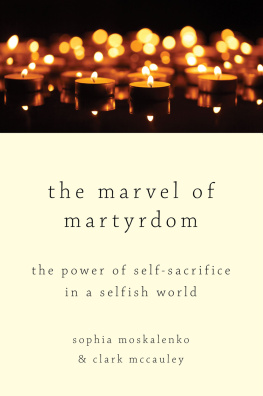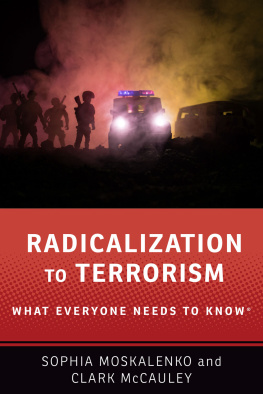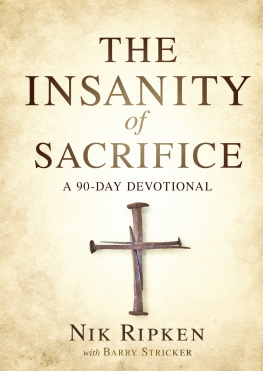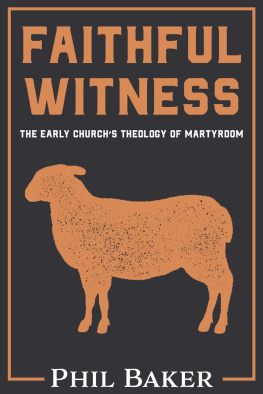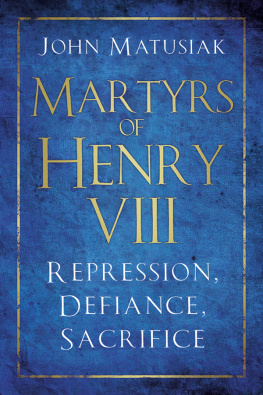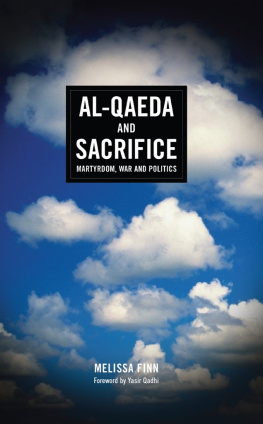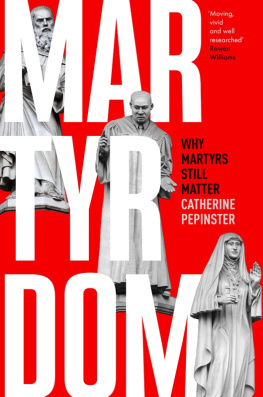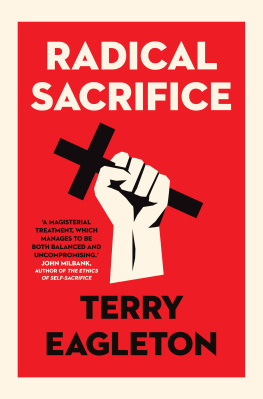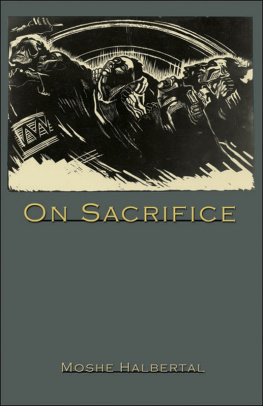The Marvel of Martyrdom

Oxford University Press is a department of the University of Oxford. It furthers the Universitys objective of excellence in research, scholarship, and education by publishing worldwide. Oxford is a registered trade mark of Oxford University Press in the UK and certain other countries.
Published in the United States of America by Oxford University Press
198 Madison Avenue, New York, NY 10016, United States of America.
Oxford University Press 2019
All rights reserved. No part of this publication may be reproduced, stored in a retrieval system, or transmitted, in any form or by any means, without the prior permission in writing of Oxford University Press, or as expressly permitted by law, by license, or under terms agreed with the appropriate reproduction rights organization. Inquiries concerning reproduction outside the scope of the above should be sent to the Rights Department, Oxford University Press, at the address above.
You must not circulate this work in any other form and you must impose this same condition on any acquirer.
Library of Congress Cataloging-in-Publication Data
Names: Moskalenko, Sophia, author. | McCauley, Clark R., author.
Title: The marvel of martyrdom : the power of self-sacrifice in a selfish world / Sophia Moskalenko, Clark McCauley.
Description: New York, NY : Oxford University Press, [2019] | Includes index.
Identifiers: LCCN 2018024941 (print) | LCCN 2018041501 (ebook) | ISBN 9780190689339 (updf) | ISBN 9780190689346 (epub) | ISBN 9780190689322 (hardcover book)
Subjects: LCSH: Martyrdom. | MartyrsPsychology. | Self-sacrifice. | Selfishness.
Classification: LCC BL626.5 (ebook) | LCC BL626.5 .M67 2018 (print) | DDC 302.5dc23
LC record available at https://lccn.loc.gov/2018024941
To all those whose sacrifices paid for our lives, freedom, and happiness.
Contents

W e live in a selfish culture. Individualism, personal achievement, self-interest, and rational choice are the guiding principles for us Westerners. And yet, in the foundation of our culture, in its ancient traditions, stories, and history lies a powerful idea that reaches beyond the satisfaction of selfish pursuits. Martyrdom and self-sacrifice are cornerstones of Western civilization. We may feel detached from the Judeo-Christian theology or from childrens folklore, but, as products of this culture, we carry within us a seed of this idea. The Marvel of Martyrdom will reveal the power of martyrdom to change the world, today as well as millennia ago.
In Western countries, there are two systems for understanding the world: religion and science. These two systems come together in surprising ways in exploring the power of self-sacrifice and martyrdom. Relying on ancient wisdom and modern science, The Marvel of Martyrdom will demonstrate the power of self-sacrifice to transform individual lives, making them happier and more meaningful.
The Marvel of Martyrdom is about martyrdom and self-sacrifice. But more than that, it is about meaning in life and triumph of the divine over the mundane.
What Do We Live For?
Once upon a time, humans lived in small kinship-based communities, where every individual was intimately tied to the communitys well-being and its very existence. Life was hard and so full of risk and danger that there could be no routine. This day there was food, but the next day everyone went without. This day you were safe, but the next day you had to fend off predators or enemies to stay alive. When you are forced to fight for life, you dont question its meaning.
Things have changed. Along came agriculture and industry, sturdy buildings, police and armies, roads and cars. In the Western world, we are removed from the origins of our food, from the forces of nature, from the birth of our children, and from the death of our elders. Whats left is the mundane.
For most of us, everyday life is a set of motions, some pleasant, some not, but all together keeping us running like hamsters in a wheel. We get up in the morning, rush to get ready, sit in traffic on our way to school and work. We put out fires, addressing the most pressing issues in our home or cubicle. At lunch, we catch up on gossip and news. In the evening, we corral our family or friends to sit around the table and feel the warmth of their community. We watch some TV or read before bed, and we retire at night to start again in the morning. The weekends differ slightly in pace and setting, but continue a busy round of activities. Every once in a while, we pause and ask ourselves, whats the point of all this hustle and bustle?
Unlike animals, we humans have the ability to see the big picture, with ourselves fading in comparisons with the billions of people living now, the billions who lived before us, and the billions who will come after us. The world may appear as a big ant hill, with tiny specks rushing around, all alike and interchangeable. What is the point, we ask ourselves? What do we live for?
There are material goals that many can agree on: a house, a salary, a Rolex, a BMW. But most people would not say these are what they live for. Ask yourself, what gets you out of bed in the morning? Is it your children? Your intellectual curiosity? Perhaps what moves you is love for your country, or your belief in justice and equality.
These are important motivations, but they are not universally understood. Your religion may mean nothing to me; your children are not my concern, and your patriotism looks like fanaticism to me. There is no monetary equivalent of ethnic pride, no price to put on religion. When you say your country is important to you, what do you mean? When you say your children are the meaning of your life, what does that translate to?
The only way to know the worth of these intangible social values is to determine how much someone is willing to sacrifice for them. We realize how much our children mean to us when we spend sleepless nights by their beds, and when we experience an unquestionable feeling that we would give everything, including our lives, to protect them. We know that justice is important to us when we get involved to protect the innocent at a personal cost, be it in a bar fight or at a staff meeting. We understand that religious belief drives us when we sacrifice Sunday sleep to go to church, or when we behave according to religious doctrine at the expense to our selfish pleasure. Our priorities and values are evident only from our sacrifices.
In other words, what we live for is what we would be willing to sacrifice for.
According to legend, the wisest man who ever lived, King Solomon, had to settle a dispute between two women. Both had given birth to a baby boy on the same day in the same house. But overnight, one baby died. In the morning, both mothers claimed the living child as their own, and they came to King Solomon for his wise judgment. The King said, bring me a sword. When the sword was brought, he ordered that the baby be cut in half, each woman to get a half of the baby she claimed as hers. One of the women exclaimed, give her the baby, only dont kill him; the other said, let nobody have him, cut him in half. Indeed a wise man was King Solomon, for in that moment he knew what was most important to each woman. For the first, who was willing to suffer the loss of her child in order to keep him safe, the most important thing was the child and her love for him. For the second, who was willing to let the guards kill the baby, the most important was to win against the other woman. King Solomon knew the true love of a mother in the first woman, because he witnessed her readiness to sacrifice for it, and to her he gave her unharmed son.

